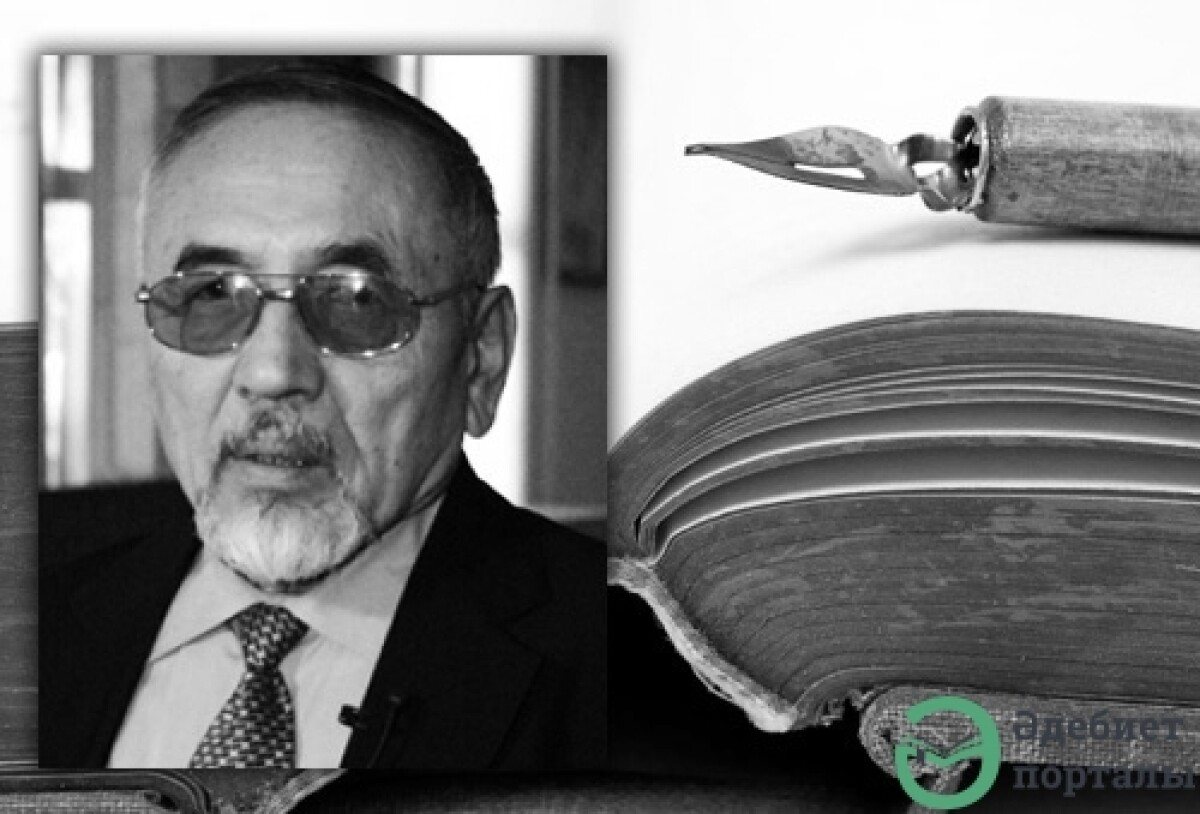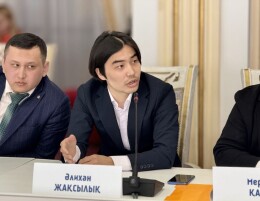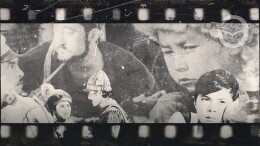Almost 3 years ago (August 13, 2014), modern Kazakh literature suffered a serious loss - on the seventy-ninth year of life the writer who became a classic, Qalikhan Isqaquli, died. Qalikhan Isqaquli – the writer that became the “gret coryphaeus” of Kazakh prose, critic, playwright, translator. He is honored person of the Republic of Kazakhstan, the winner of State Prize of the Republic of Kazakhstan and the International Literature Award called "Alash", the Honorary Citizen of Katon Qaragai county and Ayagoz county of East Kazakhstan Region.
Qalikhan Isqaquli was born in 1935 in the village of Topqayin in the Katon-Qaragai county of the East Kazakhstan region. He graduated Seven-year secondary school in this village, later graduated from high school in the village Zhuldyz of Big Naryn area. In 1952, he entered the Kazakh National University (formerly the Kirov State University) named after Al-Farabi on the faculty of «Philology" on the department of journalism, and graduated from it in 1957. He finished the Two-year Higher Courses of Scriptwriters at the State Committee of the USSR on Cinematography in Moscow in 1967 - 1972 years. After that he worked as a senior editor on the “Qazaqfilm” Cinema Studio named after Shaken Aimanov.
He published a collection of short stories "The Beginning of the Road" (1961), collections of novels "About My Friend" (1963) and "My Brothers" (1965).
Qalikhan Isqaqov actively worked in the field of film dramaturgy, was the author of scenarios of several films. Also participated in the translation of L. Tolstoy's novel "War and Peace" and translated into Kazakh a collection of novels by A.I. Kuprin "Pomegranate Bracelet".
In December 2011, Qalikhan Isqaqov gave a great interview to Adolf Artsishevsky - poet, prose writer and essayist. "Literary Portal" invites you to recall this wonderful interview, in which it was, first and foremost, of course, about literature.
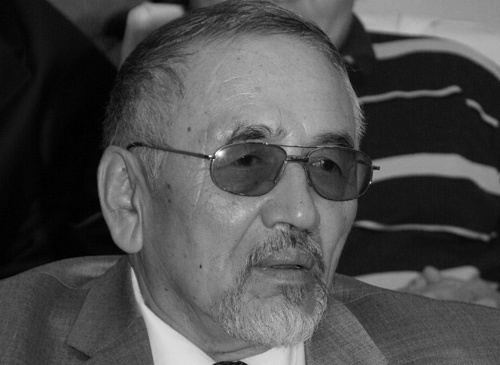
Lost landmarks
- Traditionally, Kazakh literature was sobbied by two roots - poetry and prose, - says Kalikhan Iskakov. - And if poetry today does not drag on the luggage, then the prose, in my opinion, frankly and finally slips. What's the matter? With the fall of Soviet power, prose writers have lost their bearings and can not find them - they do not know what to write about.
- Still? But it's been 20 years now, it's time to come to your senses!
- I agree, but - that is, that is. With poetry, we have always been more or less at odds, especially the young ones. Of course, there are also gaps here. Another young poet composes seemingly beautiful poems, feels the melodic language, but these are only separate, let's say, couplets, they lack epic scope. And the technique of poetry is forgotten. And as a result, there is poetic editing. And nevertheless here there is some progress. In general, poetry in Kazakh literature has always held a leading position.
As for Kazakh prose, Russian literature of the XIX century was traditionally the model for it. I just translated into the Kazakh language 40 printed sheets of Bunin's prose, his stories and "The Life of Arseniev." And Bunin-prose writer I perceive organically, as my own, Kazakh writer. Translation of a writer of this scale into another language is a delicate problem. This is not suitable for a substring, it requires deep penetration into the text, because in Bazhin the text of Bunin should acquire the birthright, and hence, literalism will not pass here. It is necessary to adopt his style, his poetic nature, his breathing. I look for his poetry in every line of Bunin's prose.How can you explain this? Let me show you his book for clarity ...
- Do not. Bunin for me as the Gospel. Did you translate only his prose?
- Yes. Poetry is not in my part. In addition, I translated Tolstoy's third volume of War and Peace. He translated Chekhov's early stories. He translated into Kazakh Kuprin's - "Olesya" and "Pomegranate Bracelet", Turgenev's story "Comrades".
- You can be envied. You live in a world of beauty ...
- When I had to leave the house on business, I hastened to complete them as soon as possible in order to return home and again go headlong into this work. Bunin I translated with pleasure, trying to convey his spirit, his style in the mainstream of the Kazakh language. I realized that it is necessary to translate this way and only so.In fact, Bunin, being by his roots a Polish aristocrat, half Kipchak. Like Lev Gumilyov. That's why Gumilyov is so close to us.
If we follow the facts, Russian literature was discovered for the Kazakhs by Zhusupbek Aimauytov-not Auezov, as was customary under the Soviet regime, namely Aymauytov. Auezov came out of Aimauytov's greatcoat, which connected us with the golden age of Russian prose. He was also an original critic. His cycle of lectures delivered at the Central Asian University is still unsurpassed in the depth of analysis of Russian classics. Meanwhile, for thirty years we were forbidden to read Aymauytov. Then, already in the 1960s, when we were allowed, we started to go ahead, discovering the layers of real Kazakh literature, and in essence, having returned 30 years ago and under the guidance of Aymauytov finally gaining his true voice. We as though wrote under its dictation.
With us it was all more or less clear. But I still can not understand the young people of today. She shows an amazing inability to work seriously in prose. Some are eager to imitate Hemingway, others are tracing Japanese literature, while others are trying to write in the spirit of Latinos. But the chapan from someone else's shoulder does not suit us, there people are different, with a different mentality. There is a completely different story, another intellectual world. Our young prose writers want to be Americans, Japanese, Colombians - they do not want to be Kazakhs.
"Do not engage in self-deception"
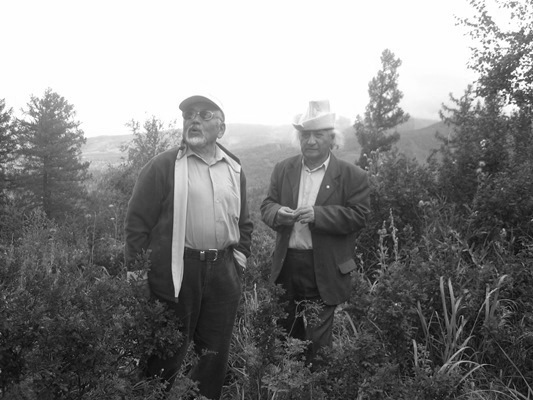
- And what's the matter?
"The fact that they did not live with Kazakhs and a rich, rich Kazakh language is unknown to them. Therefore, I only occasionally read Kazakh prose in periodicals. To read the books of a new generation of our prose writers, I have neither the time nor the desire. These books cause only disgust. You read the page or two and throw the book in the garbage container. In the periodical there is a prose of small genres, I have to read it: I was asked to lead the prose department in the Zhuldyz journal, determining what it is possible to print, and what does not go into any gates, that it is not necessary to print, it is impossible.
- That is, willy-nilly, do you have a pulse in the modern literary process?
- I have to do it, although, I repeat, it does not give me much pleasure. And as a result, I made a very sad discovery: there is no real modern prose. And the fact that they praise each other is so much lies - for me it is obvious. I try to read mostly poetry, there still somehow live life. Unfortunately, I also rarely read modern Russian literature. And I'm afraid to read after the books of the great Mohicans. Modern literary experiences in Russia and in Russia look like cheap handicrafts for the stage, and if we call things by their own names - to open prostitution. Do you want me to consider this rubbish as literature? Do not engage in self-deception. Before you sit down at your desk and start writing your immortal works, you must at least figure out what and how you're going to write. So now for writing books - the sea is spilled.Previously, over the writer's soul was censorship, restraining his creative will. Now there is no censorship, your hands are not connected. Write anything! But our prose has slipped to the level of journalism. And publicism is a matter of the moment, it can be urgent and acute, but it's one-day. Forget the next day. Newspaper and magazine genres to literature have an indirect relationship, they will not enter the spiritual fund of the people.
Now all rushed to tinker the archives, to reanimate what was banned. But this also has a very indirect relation to literature.
- That is all this at the required time?
- Yes, tomorrow nobody will read it. If the book is imbued with a critical fuse, then again this is a feuilleton character. Where already here to nest real fiction ...
- And the writer Calikhan Iskakov did not feel embarrassed and creative search?
- I also went for a long time, I thought: what should I write? He wrote the story "The Lame World" - about the years of perestroika and the first years of independence, about those distortions that are around all around. They seem to have gained independence, but life has gone down. Yesterday Savostina appeared on television ...
- For a long time it was not heard ...
"... so she was not allowed to speak." And she said: people in the outback live now worse than during the Great Patriotic War - both morally and materially. It seems that officials want to get rid of us. Get rid of those who created this world, who plowed all life, bringing the present day closer. Endured during the war, tore the veins during the five-year plans, from the last forces mastered the cosmos. And now this people - to the dump? If you do not delve into the depths of today, you can instantly slide down to the level of the bazaar and bus gossip, and artistry goes to the backyard. Every year I visit Altai, where the audience reads, but there they also put an end to modern Kazakh prose. "What's wrong with you, writers?" My countrymen ask me. Kazakh literature is about to die, they say. Like me, read one or two paragraphs and - throw out the book.
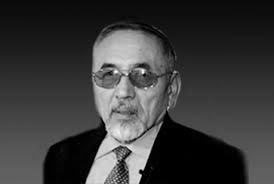
"The soul must be ill"
- But, quite recently, some 20 years ago, there was, for example, a writer like Oralkhan Bokeev. It was an opening in the Kazakh literature! Are there any such names now?
- Yes, and the very Oralhana Bokeeva ruined propensity for journalism. Due to the fact that he worked as an editor, his depth disappeared from his prose and an open text appeared. There was no subtext, it lacks a deep current.
- Let it be so. But next to us work such writers as Dukenbai Doszhanov. He seems to be trying to penetrate the human soul?
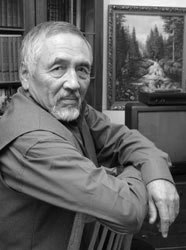 "I said a long time about him, about 25 years ago." What he does is not literature. There is milk, and there is a return from milk. This says everything. Before writing anything, Dukenbai thinks about who will translate it into Russian. The translator will pull out the text and make it not so helpless. There everything is secondary, there is no discovery, all this is written-rewritten dozens of times. We have a lot of such writers both in the middle and in the older generation. But it is not for them to determine the face of our literature. Even such a large prose writer as Magauine has slipped to secondary level, I do not want to read it, because what he writes about today has already been said many times before him. But it is high time for him to erect a monument only for the fact that he raised the writers of the giants banned by the Soviet government and, as it were, doomed to oblivion. Mukhtar Magauin returned to the literary use of their work. For his scientific work, thanks to him, but he is not an artist.
"I said a long time about him, about 25 years ago." What he does is not literature. There is milk, and there is a return from milk. This says everything. Before writing anything, Dukenbai thinks about who will translate it into Russian. The translator will pull out the text and make it not so helpless. There everything is secondary, there is no discovery, all this is written-rewritten dozens of times. We have a lot of such writers both in the middle and in the older generation. But it is not for them to determine the face of our literature. Even such a large prose writer as Magauine has slipped to secondary level, I do not want to read it, because what he writes about today has already been said many times before him. But it is high time for him to erect a monument only for the fact that he raised the writers of the giants banned by the Soviet government and, as it were, doomed to oblivion. Mukhtar Magauin returned to the literary use of their work. For his scientific work, thanks to him, but he is not an artist.
- Tynyanov out of it did not work out?
- Alas. So our Kazakh prose is now in an extremely distressing situation.
- How to be? What measures can be taken?
- It is necessary to be ill. The soul must be ill with the writer for literature. For the life that is going on around. To pass it is necessary - through the nerves, through the heart of the writer and his brain, through the suffering soul - the time in which we live. I wrote the book "The Lame World". I know, everyone has read it. And all are silent. No words of approval, no criticism. As under the Soviet regime: they are afraid to talk. Because I hurt too many painful problems. Well, for example, why workers who come from abroad are paid many times more than our specialists of the same qualification. It's a time bomb that jerked in Zhanaozen. I gave an analysis of the situation long before this explosion. The explosion could be prevented. But who would listen to me?
- Thanks to the officials?
- And officials too. Do not wait until the lid is thrown off the boiler, in which the pressure has reached supercritical values.
"You say you have to be sore." That is, appeal to conscience - while addressing first of all to youth?
- The difficulty is that young people have lost touch with the older generation.
- Maybe it's the older generation that's to blame?
- I think with gratitude about the people of the older generation, which preceded us. They tried to protect us from the tragedy that fell to their lot. And we will be grateful to them for this till the end of our days. And the current youth has renounced the older generation, ohayivaet it. And then I do not want to talk about this topic. Let us return to the problems of literature. In "Kazakh adebieti" started a discussion: is the genre of the novel necessary today? Young amicably have submitted the voice: the novel today is not necessary, nobody reads it. Hence, Aimauytov is not needed, Auezov is not needed, Musrepov is not needed, Mustafin is irrelevant ... But then the spiritual, intellectual world of the modern reader and writer will become scarce, and he already amazes with his misery. Current students at least read something from the classics? They do not even listen to lectures. In examinations, along with a student's record book, money is given to the teacher.
- So we entered the market conditions, and the market dictates everything even in the spiritual life?
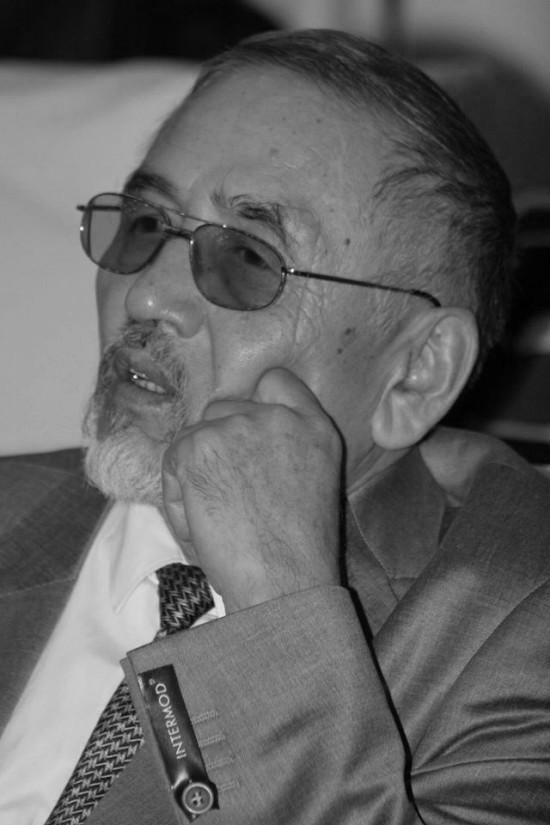 - Yes. There are 200 spectators in Astana in the academic theater. No one goes to the theater. At the play in the hall sit two people - the director and the author of the play. Officials do not go here. And on the streets there are merchants from Shymkent, Taraz, Tashkent, Bishkek. Are they going to the theater? I saw the old Akmola, I remember its spiritual aura. No matter how tall the skyscrapers are, it's not Akmola. I do not like this city, absolutely cold, to all indifferent, there live only officials and merchants. That's all. Wu, what the merchants shouted when they wanted to move the market out of town! By the way, even deputies do not go to the theater, although they are given tickets for performances free of charge. However, in the days of celebrations they are bursting here, because the masters of arts come from Almaty and Moscow and to visit their concerts is prestigious.
- Yes. There are 200 spectators in Astana in the academic theater. No one goes to the theater. At the play in the hall sit two people - the director and the author of the play. Officials do not go here. And on the streets there are merchants from Shymkent, Taraz, Tashkent, Bishkek. Are they going to the theater? I saw the old Akmola, I remember its spiritual aura. No matter how tall the skyscrapers are, it's not Akmola. I do not like this city, absolutely cold, to all indifferent, there live only officials and merchants. That's all. Wu, what the merchants shouted when they wanted to move the market out of town! By the way, even deputies do not go to the theater, although they are given tickets for performances free of charge. However, in the days of celebrations they are bursting here, because the masters of arts come from Almaty and Moscow and to visit their concerts is prestigious.
- Maybe a weak drama? Maybe uninteresting plays?
- The same plays are in Kokchetav, and the theater hall is full. There is always a full house, the spectators stand in the aisles. Do your own conclusions. Akhan-seri is not by chance born from Kokchetavshchina ...
- And yet why in literature today, according to your observations, the dominance of mediocrities? Remember the 1960s, when you did your first experiments in prose. In the literature came a whole cohort of your talented peers. Is this accidental?
"In those years when our mouth was clamped, literature was, perhaps, the only form of protest. And now we have found everything: sovereignty, parliament, government, president. But at the same time they lost the main thing - a sense of responsibility. We have ceased to regard literature as an art, holy work. On my desk lies the manuscript of a new book. She's talking about this. "The past can not be returned." Essays on 544 pages.
- And yet: these writers have remained?
- Remained. There is. And most of them are dissatisfied with the current state of things. Social sphere and politics.
"But they are silent?" Is this what our mentality is?
- This is the result of the bloody lessons of the 1920s and 1930s. The best of the best died. The people became two-faced, accustomed to the double accounting of the authorities, when everything is built on deception.
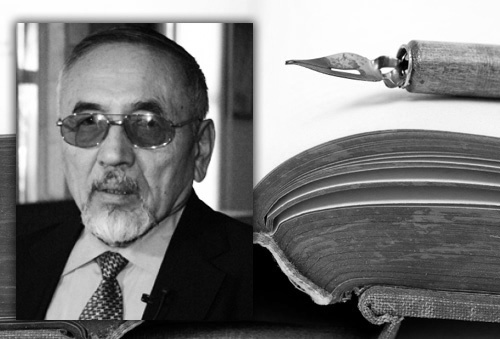
- Recently, speaking in our newspaper, Auezkhan Kodar said: Kazakhstan has two ways. One way that Abai called us to go: Kazakhs should open their soul to the world of civilization and become a part of it. Another way was indicated by Mustafa Shokai: to create a semblance of the Turkic Islamic caliphate and concentrate on solving own problems. In this regard - your point of view?
- Abai was a poet, thinker and spiritual leader of the nation, and Mustafa Shokai is a politician, focused primarily on the solution of immediate, pressing problems. With all due respect to him, intuition and common sense tell me that we must follow the path indicated by Abay. And then it is appropriate to recall Kasim-khan, who created a powerful empire of Kazakhs. He fought for 36 years with the Uzbeks, who insisted on living according to the Sharia law. Kasim-khan objected: no, we will live by secular laws. It is necessary to remember his covenants.
- In our society, the voices are growing louder, that the Kazakh language is in the backyard, it is dying, it is called upon to save it. From whom?
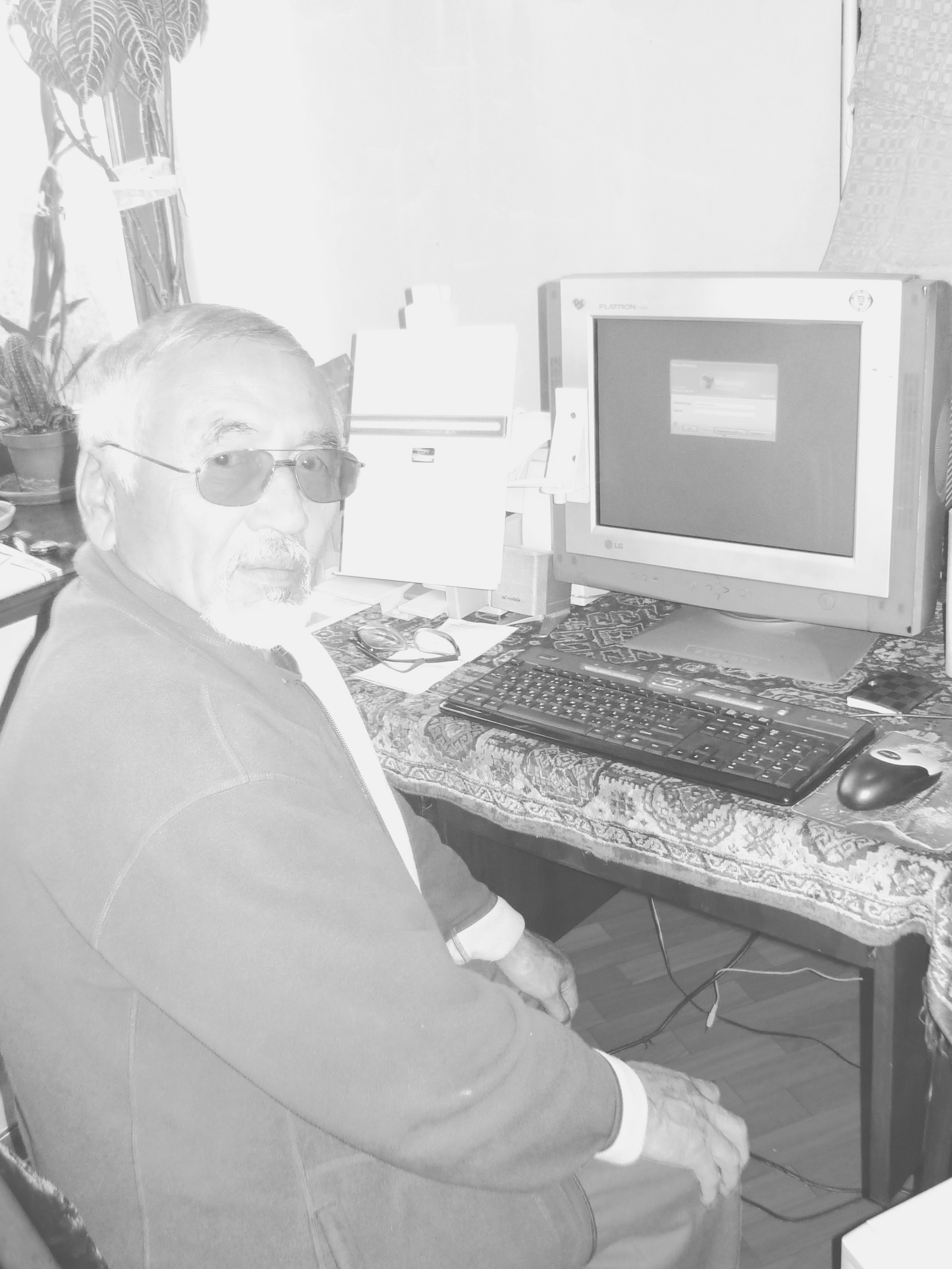 - The screamers incorrectly raised the question. The Kazakh language should not be protected from someone, but developed and revived. Earlier the older generation was the bearer of folklore, zhyrau, legends about batyrs. All this wealth they carefully passed on to the younger generations. Now all this is forgotten, the connection of times has broken. In my school years I studied grammar of Baytursynov, although it was forbidden. Over the prohibitions, I attached myself to the source of the Kazakh language. Now, in essence, there is a call to know the everyday Kazakh language, and this is the language of the merchant and the official. It is not necessary to organize battles around the language. It must be carefully and painstakingly restored and restored to the people as the greatest treasure. My grandchildren sometimes bring a newspaper or magazine in Kazakh and ask me to clarify some phrase. And there is such a rubbish printed, that ears wilt.
- The screamers incorrectly raised the question. The Kazakh language should not be protected from someone, but developed and revived. Earlier the older generation was the bearer of folklore, zhyrau, legends about batyrs. All this wealth they carefully passed on to the younger generations. Now all this is forgotten, the connection of times has broken. In my school years I studied grammar of Baytursynov, although it was forbidden. Over the prohibitions, I attached myself to the source of the Kazakh language. Now, in essence, there is a call to know the everyday Kazakh language, and this is the language of the merchant and the official. It is not necessary to organize battles around the language. It must be carefully and painstakingly restored and restored to the people as the greatest treasure. My grandchildren sometimes bring a newspaper or magazine in Kazakh and ask me to clarify some phrase. And there is such a rubbish printed, that ears wilt.
I think this: not every people has its own epic. The presence of the epic is a testament to the viability of the people. Kazakhs are a people epic and pivotal for the Turkic world. And if the Kazakh people will one day be destined to perish, then it will perish only together withh all mankind.
adebiportal.kz - Literary Portal







